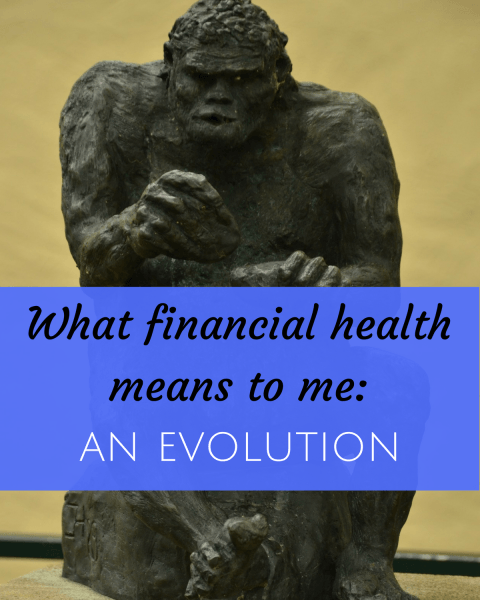By Donna Freedman
(FinCon and the Center for Financial Services Innovation are sponsoring a writing contest: “In 500 words, explain what financial health means to you.” Here are my thoughts.)
My journey to financial health was entirely roundabout, and I didn’t get there until middle age. Financial survival, not financial health, was the focus of my childhood and young adulthood.
Our one-bath, two-bedrooms-plus-attic place housed six. “Lunch” meant peanut-butter-on-bakery-outlet-white-bread sandwiches.
Clothing came down from cousins. We got a few toys at Christmas and a little meat for most suppers. I watched Dad at the kitchen table, printing the household budget. $30 groceries. $10 shoes. $15 Sears.
When my mother moved out it was natural (if not healthy) that I took over, pinching pennies and fretting a hole into my 16-year-old stomach lining. We always broke even — the only kind of money health I knew.
Inching toward financial health
Five years later I was a single mom in a slum, supporting my daughter with a “permanent part-time” job and no government aid. I washed laundry and diapers on a scrub-board, cooked lots of beans, dressed the baby in hand-me-downs.
And I had the credit union scrape a sliver off each paycheck. Without a cash cushion, I knew I’d be sunk. (Still true: According to Financial Health Network, 36 percent of households have more month than money.) I coped, but I was usually exhausted, often hungry and always on guard for the next emergency.
No wonder being pressure-romanced by a coworker felt dreamlike: He owned his own place! Unfortunately, he turned out to be both an abuser and a spendthrift.
My frugality (which he derided) made sure our 401(k)s were funded. Although I didn’t know it, I was inching toward financial health.
Hard times return
Years later I finally escaped, taking half our liquid funds. Though jobless, I felt hopeful because he couldn’t touch this money.
Except that he did, through a vengeful two-year divorce. My cash dwindled while I worked several part-time jobs, attended college and supported my disabled adult daughter. Living on crumbs wasn’t new. Neither was faith: I believed I’d prevail.
First I earned a full-ride scholarship. Miraculously, I landed a lucrative contractor job: Now I could clear divorce-related debt and resume saving for my golden years; I’d learned just how vital this was. (Only 55 percent of those surveyed by Financial Health Network have at least $10,000 in retirement savings.)
Even more miraculously, I’d found true (and frugal!) midlife love. Things were wonderful, until they weren’t: The contractor job ended without warning.
Financial health and quality of life
Our shared expenses were low. How much work did I really need? Yet panic set in and I chased freelance projects nonstop, burning out after two years.
Which was a blessing, actually, because it helped me realize financial health isn’t just about wealth. It’s also about quality of life.
Money is a useful tool. It is not a religion. Take care of business, including saving for emergencies and retirement. But establish a work-life balance in accordance with your values.
For me, that means enough work to cover the bills and frills, and to meet retirement and savings goals. The rest of my time goes to family, friends, mentoring and, lately, writing books.
Making careful choices has given me a secure, happy life. That, to me, is the essence of financial health.
This blog post originally appeared June 27, 2017 on DonnaFreedman.com. MetLife Foundation is a major sponsor of Financial Health Network’s ongoing consumer financial health work. Additional support for #FinHealthMatters Day and USFD provided by the Citi Foundation. To learn more about FinHealthMatters from Financial Health Network, sign up here.
